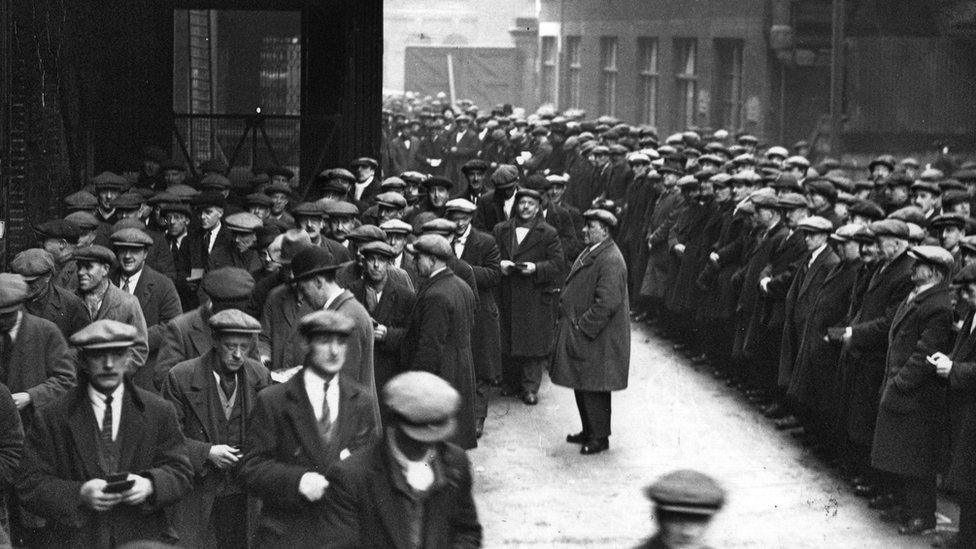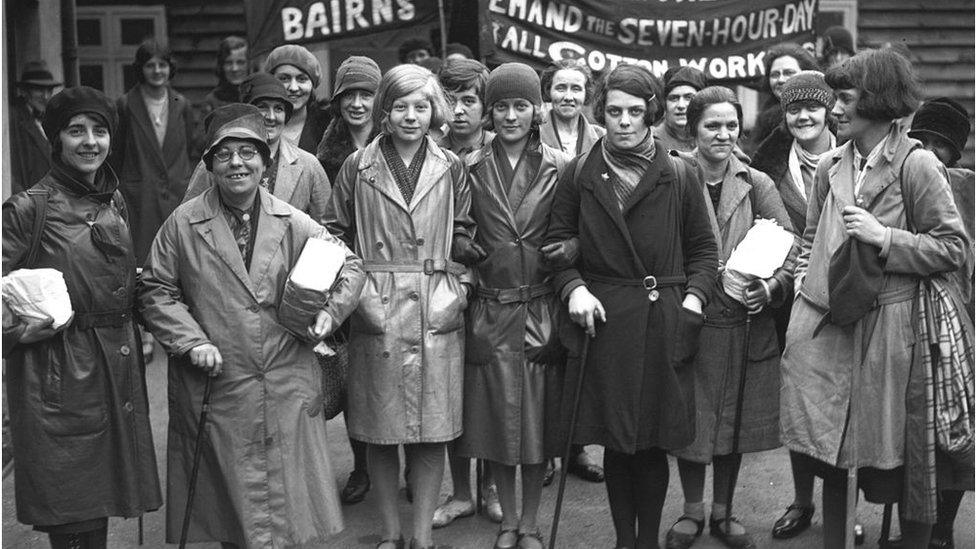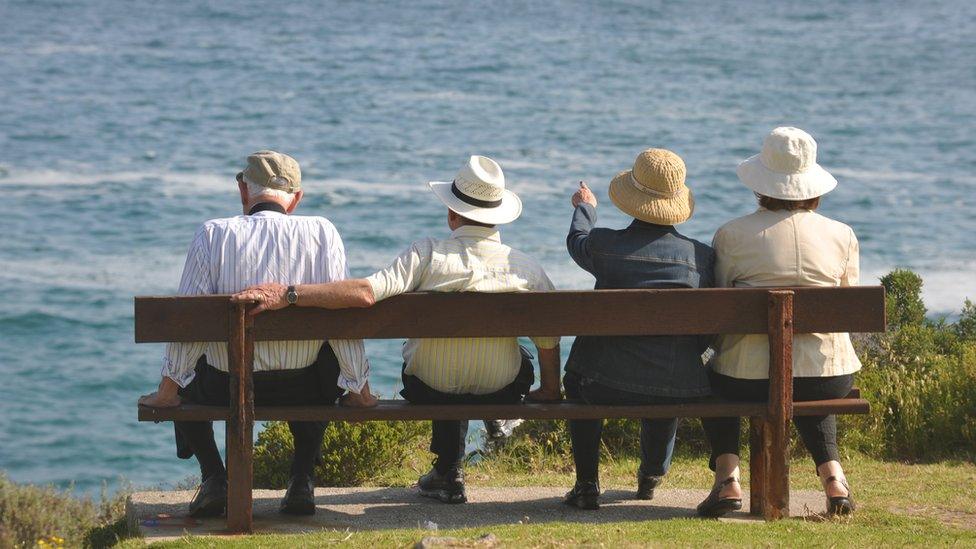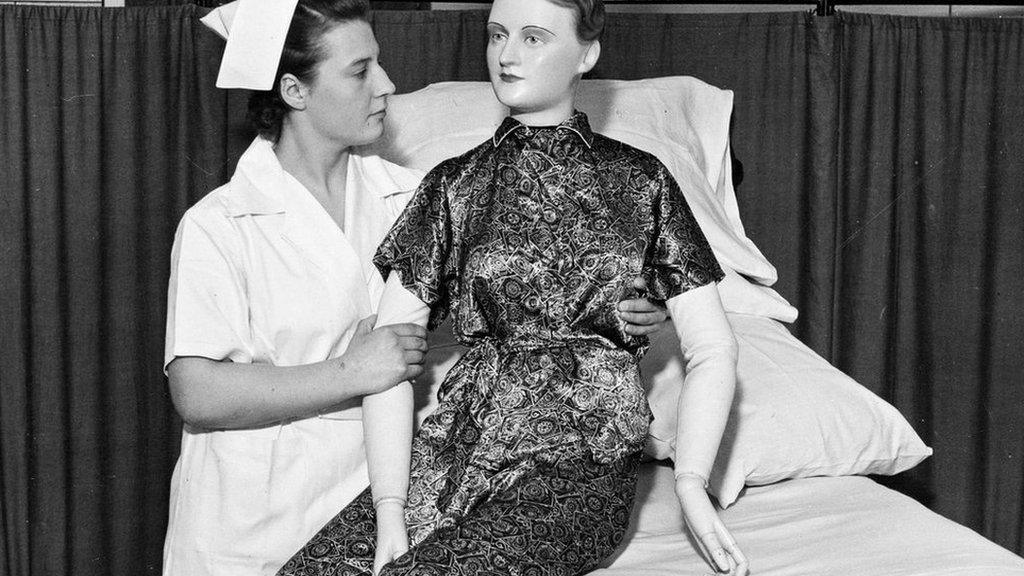Coronavirus: Is it time for a new Beveridge report?
- Published

The report sought to tackle the effects of unemployment
Into bombed out wartime Britain dropped a government commissioned report that still reverberates today.
Almost 80 years since Sir William Beveridge published his plans for a new system of "cradle to grave" social security, politicians on the left and right are trying to claim the spirit of the Beveridge era as they sketch out plans for life after the pandemic.
At his party conference last year, Boris Johnson described how, in the depths of World War Two, the National Government had set out a vision for a New Jerusalem.
And in a speech last month, Labour's leader Sir Keir Starmer said Covid-19 had been a call to arms that now required a Beveridge-scale response from government.
But is this simply political hyperbole or are we at a similar turning point?
The pandemic has certainly been a shared upheaval and trauma unlike anything Britain has experienced since the war.
Sir William Beveridge's 1942 report did not land without warning.
It had been commissioned by a government made up of Conservative and Labour ministers who were already thinking about reconstruction even as the fighting continued.
The experience of war had amplified a debate about the condition of the country - its poverty, housing and health.
But the 300-page report that Sir William, a Liberal retired civil servant, delivered that December was an immediate sensation.
The dryly titled Social Insurance and Allied Services, external report was densely technical but charged with moral purpose. Beveridge described slaying the "five giants on the road to reconstruction": Want, disease, idleness, ignorance and squalor.
Implemented after the war by Labour, the report's recommendations laid the foundation of the modern welfare state and the NHS was also born. It was a short period of radical social reform without precedent.

Women marching in 1939 to demand a seven hour day for cotton workers.
Does this feel a similar moment? A war and a pandemic are very different of course. And the UK today is a country Sir William Beveridge wouldn't recognise.
Wealthier, more diverse and wired into a mobile, global economy. Many of the jobs people do are utterly different compared to the 1940s.
But Beveridge would recognise the broad debates about poverty, insecure employment, the nation's health and inequality that have been magnified by Covid.
A decade ago, the epidemiologist Professor Sir Michael Marmot wrote a major report on health inequalities, external. He's recently produced another Beveridge-esque study called Build Back Fairer.
He says of his review: "Life expectancy had stopped improving. Inequalities in health were increasing and life expectancy for the poorest people outside London was going down. It means we were in terrible shape."
The pandemic has cruelly exposed the underlying vulnerabilities of UK's health. It has shone a harsh light on the state of the social care sector too.
Perhaps that is the issue a modern-day Beveridge might choose to tackle first - whoever that may be.
Unlike the NHS, social care is not free at the point of use.
The delivery of health and social care is devolved to Scotland, Wales and Northern Ireland. Each nation has developed their care systems in different ways.
England awaits reform.
All recent governments have known an aging population requires complex care within a system that is properly and sustainably funded. But despite years of reports, a Royal Commission and a forest full of policy papers, the nettle has never been grasped.

An ageing population presents a major challenge to today's welfare state
This government has promised proposals by the end of this year.
Indeed, at a Liaison Committee session on Wednesday, Boris Johnson said there will be proposals brought forward in the coming year.
"It is going to be difficult. There is no solution to social care which avoids real decision about who pays for what and how much we pay," says Rachel Wolf, who co-authored the Tories' 2019 manifesto.
"My assumption is they will not only bring forward some kind of package around funding but also about how it's delivered.
"Do we want to make it easier for there to be in-home social care for example? What is that we want the workforce to look like and how are we going to train and support them? Often with social care we get so caught up in the funding question we don't actually discuss any of the others," she told me.
The costs of social care can be catastrophic for people. Care is means-tested and unlike the NHS, the principle of pooled risk does not apply.
But could the aftermath of the pandemic be the moment a cross-party consensus on the future of social care might be found?
Recent history is not encouraging.
Less politically controversial, but perhaps just as hard to tackle, are the inequalities in health exposed by coronavirus.
"Obesity and deprivation and poverty and the type of job you lead have all contributed to the increased death rate in this country from Covid-19," according to Dame Sally Davies, the former Chief Medical Officer for England.
She believes tackling obesity is an urgent priority ("we are the fatties of Europe," she says) and has called for an extension of the sugar levy and for private companies to contribute to a public health investment fund.
"I think post-Covid-19, the government has the mandate to do something different along the Beveridge lines. Beveridge got us to invest in a national illness service. We needed that then and still need it. But alongside that we need to invest in prevention."
The political historian Peter Hennessey believes the "never again" impulse that sprung from the war is evident now and could be harnessed to build consensus around five new priorities.
He has suggested: housing, technical education, tackling climate change, preparing the UK for the impact of artificial intelligence and, of course, reform of social care. Others will have their own ideas about what the UK might be galvanized to tackle.
Or perhaps, as the jabs rollout, the pubs reopen and families reunite, Britain will muddle its way back to business as usual with a sigh of relief.
'We've been waiting for so long'
Before the pandemic hit the post-Brexit (media) narrative was about a fractured country of conflicting values, outlooks and views. Is there really the popular kindling for a new consensus around radical social reform?
Compared with the figures who drove through the Beverage agenda are today's politicians too small to try and grapple modern giants?
Citing Sir William Beveridge and the era's reforming zeal is the easy part. Carrying the country into action may prove much harder.
- Published26 April 2018
